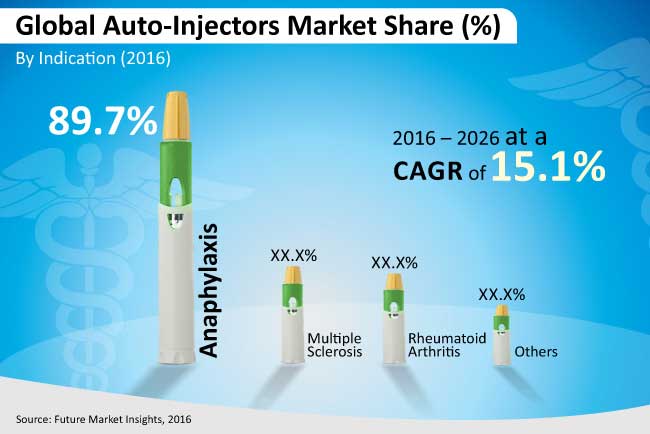Prefilled auto-injectors segment anticipated to contribute to the highest growth opportunity due to growing demand for intramuscular drug delivery in the global auto-injectors market
Auto-injectors are pen like devices used to deliver a fixed dose of drug to patients and are intended for self-administration. Auto-injectors are gradually becoming the gold-standard in the treatment of various indications like anaphylaxis, multiple sclerosis, rheumatoid arthritis and others. Most of the auto-injectors are spring loaded, and the procedure is relatively simple. These are specialised instruments that can be used to avoid needle stick injury and reduce needle phobia among patients. In 1990, the first reusable auto-injector, known as Imigran was launched for the treatment of migraine. Auto-injector manufacturers are focussed on user centric design approaches to enhance ease-of-use and overcome the unwillingness associated with self-administration of intramuscular injections.
Auto-Injectors are expected to present vast opportunities to investors due to high demand in biologics development. Overall revenues from the pre-filled syringes segment is expected to grow during the forecast period due to the rising need for targeted and sustained drug delivery. In September 2015, Bayer Healthcare reported the launch of Betaconnect – the only electronic auto-injector for the treatment of relapsing-remitting multiple sclerosis (RRMS). The procedure does not require a visit to hospitals, clinics, etc. and reduces dependency on healthcare professionals, which is why auto-injectors are becoming a choice of therapy for patients suffering from anaphylaxis, multiple sclerosis, rheumatoid arthritis and others. Increasing adoption of auto-injectors due to benefits such as increased safety, accuracy and minimal discomfort is expected to fuel market revenue growth over the forecast period.
Request For Sample@ http://www.futuremarketinsights.com/reports/sample/rep-gb-1642
The global auto-injectors market was valued at nearly US$ 1700 Mn in 2016. The market is anticipated to exhibit a CAGR of 15.1% during the forecast period and is projected to be valued at nearly US$ 7,000 Mn by the end of 2026.
Global Auto-Injectors Market Analysis & Forecast, By Indication, 2016–2026
Anaphylaxis segment dominated the global auto-injectors market by indication in terms of revenue in 2015 and the trend is projected to sustain throughout the forecast period. Anaphylaxis segment is the most attractive segment with an attractiveness index of 3.55 over the forecast period. Revenue from the anaphylaxis segment is anticipated to register a CAGR of 15% over 2016–2026, to reach more than US$ 6,000 Mn by 2026. Multiple sclerosis segment is expected to be the second most lucrative segment in the global auto-injectors market by indication, with an attractiveness index of 0.2 during the forecast period. Multiple sclerosis segment accounted for 5.3% value share in 2016 and is projected to account for 5.5% share by 2026 end.
Global trend: Reduction in reliance on healthcare provisions due to auto-injectors
Auto-injectors are economical as they reduce about 95% of primary healthcare costs, as there is no need to attend clinics and hospitals for administration of the injection by healthcare professionals. Auto-injectors provide inexpensive home medication and reduce the time consumed at in-patient and out-patient care units. For patients requiring frequent dose administration on weekly and daily basis, the use of auto-injectors reduces the average cost per injection. In addition, auto-injectors reduce needle-stick injuries. Reduction in dependence on healthcare professionals is boosting the use of auto-injectors and is likely to increase the revenue growth of the market over the forecast period.
Send An Enquiry@ http://www.futuremarketinsights.com/askus/rep-gb-1642

Key players in the global auto-injectors market
Some key players in the global auto-injectors market included in this report are Becton, Dickinson and Company, Sanofi, Pfizer, Inc., Mylan N.V., Novartis AG, Bayer AG, Janssen Global Services, LLC, Antares Pharma, Inc., Amgen Inc. and Eli Lilly and Company. Mylan N.V. is a leader in the global auto-injectors market in terms of revenue share. Mylan holds a market share of about 83.7% in the global auto-injectors market owing to the fact that the blockbuster product “Epipen” is a widely sold auto-injector and has a tremendous contribution to the global auto-injectors market. Becton, Dickinson and Company is one of the leading manufacturers of refillable auto-injectors focussing on manufacturing Physioject that is compatible with several injectable drugs. In terms of revenue, Becton, Dickinson and Company holds about 8.4% of the global auto-injectors market share owing to a rising adoption of Physioject.
Analyst’s Viewpoint
Reduction in price due to approved generic versions will boost the sales revenue of global auto injector devices over the forecast period
Drop in price of Epipen from US$ 600 to US$ 300
Auto-injectors manufacturers are introducing generic versions in order to reduce the overall cost of the device. In order to better serve anaphylaxis patients with epinephrine at an affordable cost, Mylan N.V. has implemented the decision of introducing the generic version of Epipen at half the price. The initial pack of two was sold at US$ 600 till December 2016 which will be sold at US$ 300 from January 2017. This has increased the affordability of insured as well as non-insured patients to opt for Epipen. This drop in price will increase the penetration of the EpiPen auto-injector, which holds around 90% share of the overall market.
Browse Full Report@ http://www.futuremarketinsights.com/reports/auto-injectors-market
